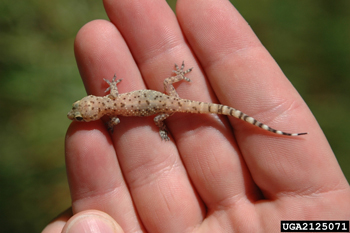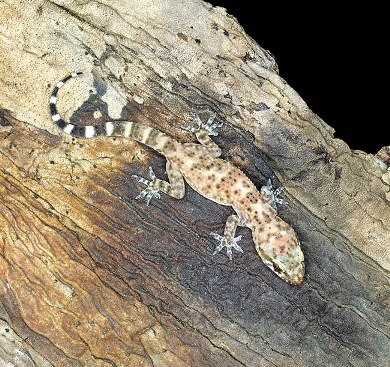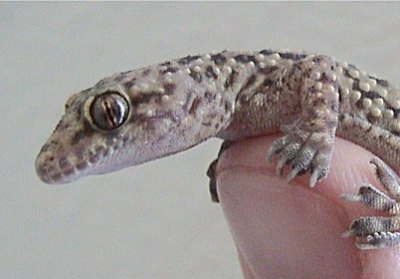
There was a tragedy last week – one that could have been avoided with a bit more care.
It’s the time of year when days are warm and nights are
chilly. And in these conditions one of the least visible of my
year-round residents becomes more visible, starts taking risks. And
sometimes meets a bad end.
There are many kinds of gecko in the world, but one that
commonly occurs here in north Texas is the Mediterranean House Gecko
(Hemidactylus turcicus). The Mediterranean gecko is a relatively small, 4
- 5 in (10 - 13 cm), species that has become ubiquitous in certain
areas of the United States. Unlike any native lizard, geckos have sticky
toe pads, vertical pupils, and their large eyes lack eyelids. These
geckos are generally light gray or almost white in color (they look like
tiny “ghost lizards”) but may have some darker mottling. The
Mediterranean gecko can usually be found preying on insects near
external houselights or other forms of lighting on warm nights. When it
gets cold, they creep into warmer areas like crawl spaces under houses
through foundation cracks or vents. On my church building we often see
them over the entry door, catching bugs attracted by the light. My son
has often found them hiding under the cover of an outside electrical
outlet next to his garage door that has a floodlight immediately
overhead.
Due to their ability to breed rapidly and strong resistance
to pesticides, the Mediterranean gecko has been able to establish steady
populations all along the Southern United States. Throughout Texas
there are strong breeding populations of Mediterranean geckos found
around cities, especially the Houston area, but there are major gaps in
the population range through the western parts of Texas and into the
panhandle. This leads scientists to believe that the Mediterranean gecko
may need human structures and possibly cannot survive in dense native
forests.
A nocturnal species, Hemidactylus turcicus can be found in
cracks and crevices, either man-made or natural, throughout the day,
emerging at night to feed on insects and other invertebrates. But when
chilly nights come along, they like to sun themselves mornings on warm
walls or masonry surfaces like patios and steps.

|
|
Bottom line is, geckos here in Texas may exist in your house and
surroundings for years and not even be seen. Unless you have cats. Cats
respond to motion. And when geckos come out of their hiding crevices (as
narrow as a quarter of an inch or even smaller) cats see the movement
and pounce. And play.

|
|
My introduction to the geckos in my house was years ago when I
found a wriggling bit of “stuff” in my hallway – a gecko tail that had
been shed in the manner many lizards have – shedding their tails to
distract predators, then fleeing while the predator is dealing with the
still-wriggling tail. Later (if they survive) they grow a new tail.
Presumably there had been a cat encounter, although the cats weren’t
talking.
So I’ve known for at least 20 years that I have geckos in my
house, but they’re so secretive and small I tend to forget them – until
they draw attention to themselves without meaning to. Last week on
Wednesday I opened my car door and found a gecko running way across the
floor mat in front. How it got inside I don’t know, but suspect there
was a crack around the door seal large enough for it to squeeze through.
Having sticky toes, it would have had no difficult climbing up onto the
car from the concrete driveway. I spent several minutes peering under
seats and turning up floor mats, but failed to find it, so I just went
on my errand, figuring it would eventually find its way out the same way
it got in.

|
|
When I got home, I searched a bit more before giving up, then
went into the house and decided it was time to replenish my hummingbird
feeder. That involves going down the steps to my patio, walking
carefully into a narrow disused flower bed next to the house wall,
reaching down the feeder from an overhead hook, then reversing my path.
But when I reversed path, looking carefully where I was
stepping so as not to fall down, I saw something wriggling on the
concrete patio surface. I was greatly saddened to discover I had
inadvertently trod on a gecko and it was “beyond repair”. Even the
gecko’s powers of tail shedding and regrowing part of its body wouldn’t
save it this time.
I’m very sensitive to my relationship with the world around
me. This accident really “got” to me. Carelessness about another life
form while on a mission to help yet another life form had led to my
causing a death in the world that could have been avoided.
I did the only thing I could think of at the time – I placed
the still moving body on some loamy soil in the flower bed and gently
covered it with loose loam. Nature would take care of the rest.
I can only hope the gecko in my car managed a safe getaway. And stayed away from cats and errant human feet.





No comments:
Post a Comment